Table of Contents
Ever wondered how products flow seamlessly from warehouses to your doorstep? Enter the world of material handling companies – the unsung heroes of modern commerce.
In 2021, this industry was worth $USD 213.35 globally, and for good reason. As ecommerce booms and supply chains grow complex, businesses are racing to keep pace. Material handling solutions offer a lifeline, providing equipment and strategies that streamline operations and cut costs throughout the supply chain lifecycle.
From high-tech machinery to innovative logistics, these companies are the secret ingredient in efficient manufacturing and distribution. Want to know how they could transform your business? Let’s dive in and learn more about materials handling solutions.
What are Materials Handling Equipment Suppliers?
To understand what a material handling equipment supplier is, you first need to know about material handling.
Material handling or material movement describes how goods and materials are transported, stored, and distributed through the supply chain. An efficient materials handling system can streamline operations and enhance overall productivity.
Businesses looking to optimise this process have turned to materials handling equipment suppliers to furnish them with the tools and material handling solutions they need.
Let’s now talk about material handling equipment types.
Transportation Equipment and Conveyor Systems
This includes any equipment used for bringing goods from one place to another. This equipment is crucial in various industrial settings where the safe and efficient movement of goods is essential. Within the manufacturing process, this can also relate to shipping and distribution.
Conveyors
Conveyors carry materials from one fixed point to another. Conveyors can carry individual units, which are often assembled using unit load conveyors. They can also carry materials in bulk, such as raw or unorganised material, using bulk load conveyors.
Industrial Trucks
These include various truck types with different capacity, loading, and unloading capabilities. For instance, hand trucks are one of the most common types. They’re used for lifting and then carrying heavy items to their destination.
Loading Equipment
Loading and transport work closely together. Much of the equipment used in transportation is also used for efficient loading and unloading.
There are also other types of equipment are specifically used for loading. Loading equipment is designed to reduce the physical strain and risks associated with manual handling tasks.
-
Hoists: Hoists are used to lift heavy loads. These can be both electrical and manual.
-
Slip-sheets: Products are inserted inside on a slip sheet tab or edge. You can then use slip-sheets to pull and push items out of position.
Organising and Positioning Equipment
Bulk materials (which often come in loose, raw form) need organising and positioning to be stored effectively. While conveyor belts can filter for certain types of products, it’s also common to use industrial robots and balancers. The use of automated equipment, such as industrial robots, can significantly enhance the efficiency and accuracy of these tasks.
Industrial robots can manage complex positioning and organising tasks such as picking and placing items on and off a conveyor.
Whereas balancers, as the name implies, provide help to balance products correctly. This helps to ensure they’re stored for optimal spacing and remain undamaged.
Storage Equipment
Storage equipment relates to non-automated stages of product handling. For instance, units where items are kept such as:
-
Racks: Pallet racks, push-back racks, and drive-in racks can store materials on multiple levels.
-
Stacking frames: These are stackable structures containing various materials without damaging their content.
-
Shelves, bins, and drawers: These are used to sort and store smaller items.
Automated Storage and Retrieval Systems (AS/RS) equipment work similarly to the equipment mentioned above but are automated solutions controlled by computer programs to store and retrieve items.
With all these kinds of equipment in mind, let’s look at why partnering with a material handling supplier company can be beneficial for your business.
The Benefits of Material Handling Equipment Suppliers
Material handling equipment offers multiple benefits for businesses:
-
Increased Productivity: Automated systems work faster and more consistently than manual labor, speeding up production lines.
-
Reduce Life Cycle Cost: While initial investment may be high, the long-term savings in labour and efficiency often result in lower overall costs.
-
Minimise Human Error: Machines don’t get tired or distracted, reducing mistakes that can slow production or lead to quality issues.
-
Enhanced Safety: Proper equipment use can significantly decrease workplace injuries, protecting your most valuable asset – your workforce.
-
Improved Job Satisfaction: By reducing physical strain on workers and allowing them to focus on more skilled tasks, material handling equipment can boost employee morale and retention.
These advantages showcase how the right material handling solutions can transform operations, benefiting both the company’s bottom line and its customers.
Speaking of customers…
If you have fewer accidents and a faster production line, you can produce more and service more customers.
On the topic of customer satisfaction, the precision and efficiency of handling equipment can also reduce the number of damaged products. Efficient waste disposal methods can also contribute to cost savings and improved operational efficiency.
And lastly, automated storage solutions can usually optimise spacing to maximise warehouse space. Again, this should help to save you money.
Choosing Material Handling Equipment Suppliers
Now that we’ve covered the basics, let’s take a look at some of the considerations to bear in mind as you go about selecting a suitable material equipment supplier for your business.
Specialisation
If you work in a particular industry, your equipment requirements might be best met by a supplier who can cater to the exact demands of your business. For example, manufacturing facilities may require specialized equipment to handle heavy goods safely and efficiently.
First, look at whether the supplier has the right type of equipment to help you reach your goals. Then, ensure your supplier understands your needs from the start and compare other supplier services to ensure you are getting a good deal.
Reliability
Take a look at their customer service. Ask questions about what happens when a machine goes down and how they can help you after hours. All these things will matter when something goes wrong.
It is also worth checking their credentials with your local regulating authority. Make sure they are a registered supplier and look at their customer satisfaction ratings in reviews and feedback.
You can also get an overall idea of business success by looking at how they perform on the market. Look at their market shares to see if investors think they’re a company worth investing in.
With all of this information, you can get a sense of whether you’ll get the best value for your money.
Flexibility
You want to find a supplier who can adapt to your company’s changing needs. First, ask yourself whether the supplier’s models are scalable. By this, we mean will they accommodate you as your business grows?
If you foresee your business gaining more customers or needing to handle more materials, consider whether the supplier has the equipment to meet those needs.
Ready to Find a Material Handling Equipment Supplier?
We hope this has given you lots of information to support your search for a material handling equipment supplier.
Material handling equipment suppliers can also provide solutions for the efficient transportation and management of construction materials.
Are you looking for other ways to automate your supply chain? Read our article about what software integrations are available with Transvirtual.


